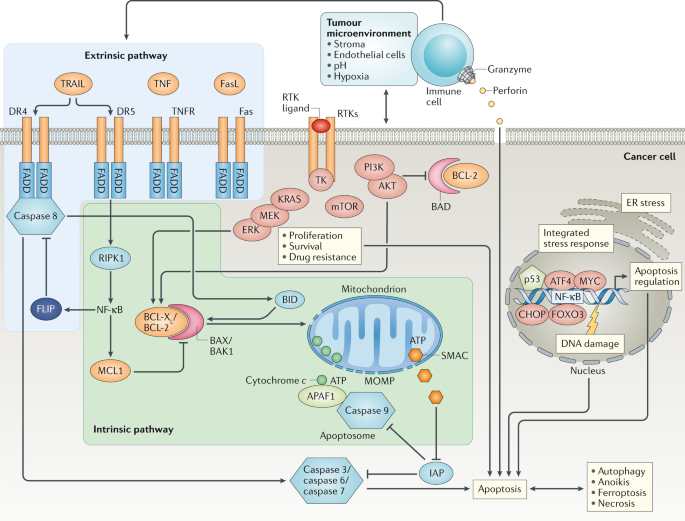
- Select a language for the TTS:
- UK English Female
- UK English Male
- US English Female
- US English Male
- Australian Female
- Australian Male
- Language selected: (auto detect) - EN
Play all audios:
For over three decades, a mainstay and goal of clinical oncology has been the development of therapies promoting the effective elimination of cancer cells by apoptosis. This programmed cell
death process is mediated by several signalling pathways (referred to as intrinsic and extrinsic) triggered by multiple factors, including cellular stress, DNA damage and immune
surveillance. The interaction of apoptosis pathways with other signalling mechanisms can also affect cell death. The clinical translation of effective pro-apoptotic agents involves drug
discovery studies (addressing the bioavailability, stability, tumour penetration, toxicity profile in non-malignant tissues, drug interactions and off-target effects) as well as an
understanding of tumour biology (including heterogeneity and evolution of resistant clones). While tumour cell death can result in response to therapy, the selection, growth and
dissemination of resistant cells can ultimately be fatal. In this Review, we present the main apoptosis pathways and other signalling pathways that interact with them, and discuss actionable
molecular targets, therapeutic agents in clinical translation and known mechanisms of resistance to these agents.
Apoptosis can be induced in cancer cells through intrinsic and extrinsic pathways, which converge on the regulation of caspase-dependent proteolysis of thousands of cellular proteins,
membrane blebbing and endonucleolytic cleavage of chromosomal DNA.
A limited number of FDA-approved anticancer agents directly target apoptotic pathways; these small molecules are designed to inhibit anti-apoptotic BCL-2 family members.
Other promising therapeutic strategies for activating apoptosis in cancer cells include agents that trigger the extrinsic apoptosis pathway, those that target tumour suppressor pathways or
the tumour microenvironment, and combination drug therapies.
The antitumour efficacy of several FDA-approved agents targeting cell survival and proliferation pathways in cancer cells is also dependent on their effects on apoptosis signalling pathways.
Both cell-mediated immunotherapy and immune-checkpoint inhibition induce apoptosis in cancer cells through the extrinsic pathway; the possibility of potentiating this effect using
combination regimens (involving targeted therapies, cytotoxic agents or radiotherapy) is currently under investigation.
Owing to the vast literature available for this topic, in several cases key reviews are cited to point readers to original articles. The authors apologize to colleagues for not including all
possible high-impact original references and reviews. W.S.E-D. is an American Cancer Society Research Professor and the Mencoff Family University Professor at Brown University. The work of
W.S.E-D. is supported by NCI grants CA173453 and CA176289.
The Warren Alpert Medical School, Brown University, Providence, RI, USA
Both authors made a substantial contribution to all aspects of the preparation of the manuscript.
B.A.C. has received funding for clinical trials from AbbVie, Actuate Therapeutics, Astellas, AstraZeneca, Bayer and MedImmune. W.S.E-D. is the scientific founder and a shareholder of
Oncoceutics and p53-Therapeutics, and has received support for clinical trials from Bayer, BMS and Genentech.
Nature Reviews Clinical Oncology thanks J. Montero, S. Tait and the other, anonymous, reviewer(s) for their contribution to the peer review of this work.
Springer Nature remains neutral with regard to jurisdictional claims in published maps and institutional affiliations.
Anyone you share the following link with will be able to read this content:






